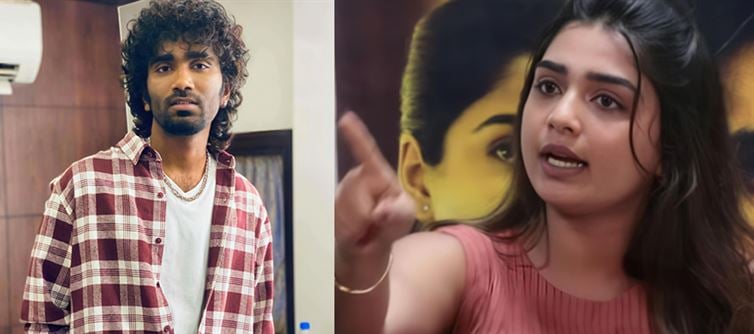
🚨WHEN OUTRAGE BECOMES A HOBBY
The entertainment industry is fast becoming a landmine of sensitivities. Recently, actress Gouri Kishan lashed out at film journalist Karthik after he asked her what her weight was during an interview. Her response — “How does my weight concern you? My weight is my choice; it doesn’t define my talent” — ignited a storm.
Soon, social media turned into a battlefield. Feminist influencers accused karthik of body shaming, misogyny, and male entitlement.
But here’s the twist: karthik later clarified that he asks height and weight from all actors — male and female — as part of his professional data-keeping process.
Meanwhile, tamil actor Pradeep Ranganathan was mocked by a female journalist in hyderabad who told him:
“You don’t look like hero material, yet your movies become hits. How?”
No outrage. No hashtags. No lectures on ethics.
When a man is insulted, it’s comedy. When a woman is questioned, it’s harassment.
Welcome to the hypocrisy olympics of modern outrage.
⚖️ THE INCIDENT: A QUESTION TURNED INTO A CRIME
Let’s start with facts.
Karthik’s question was direct but hardly scandalous: “What’s your current weight?”
He didn’t mock her, didn’t comment on her appearance, and didn’t say anything disrespectful.
Gouri took offence, calling it “body shaming and male chauvinism.”
Her reaction might have been emotionally valid, but the mob that followed turned it into a public lynching.
Thousands of comments poured in — abusing, threatening, and labeling karthik as sexist.
A career journalist suddenly became a villain for asking a statistical question.
💬 THE DOUBLE STANDARD: MEN CAN’T EVEN BREATHE WRONG
Now let’s flip the scenario.
When actor Pradeep Ranganathan was promoting his film DUDE in hyderabad, a woman journalist said,
“You don’t look like hero material, yet your movies become hits.”
That’s not a question — that’s a personal insult, cloaked as curiosity.
Imagine if a male journalist told an actress:
“You don’t look like a heroine, yet people watch your films. How?”
There would’ve been breaking news, feminism threads, think-pieces, and hashtags about “toxic male gaze.”
But when the mockery goes the other way, silence reigns.
Apparently, equality ends when the joke’s on women.
💣 THE HYPOCRISY OF “BODY POSITIVITY”
The same people who preach “body positivity” for women are perfectly fine mocking men for:
Height
Baldness
Weight
Income
Job status
Skin tone
Fashion sense
Men are told to “take a joke,” “be confident,” or “stop being so sensitive.”
But the moment a woman’s appearance is mentioned — even neutrally — the entire internet becomes her army.
That’s not empowerment. That’s selective victimhood.
If body positivity is real, it should apply both ways.
🧠 THE OUTRAGE ECONOMY: HOW VICTIMHOOD GOES VIRAL
Let’s be honest — outrage is the new PR.
An emotional quote, a tweet storm, and a few viral clips — and suddenly, everyone is a hero for “speaking up.”
But the real cost? Dialogue dies. Balance dies. Journalism dies.
We’re raising a generation of artists and journalists who are terrified of offending feelings but careless about defending facts.
🧨 FEMINISM’S MODERN PROBLEM: SELECTIVE ACCOUNTABILITY
True feminism stands for equality — not emotional hierarchy.
But what we often see today is weaponized outrage — a culture where accountability depends on your gender.
If a man makes a mistake, he’s canceled.
If a woman does the same, she’s “just expressing herself.”
Equality isn’t about who shouts louder — it’s about holding everyone to the same standard.
💬 THE QUESTION WE NEED TO ASK
Why do we believe that women’s dignity is fragile but men’s ego is disposable?
Why do we celebrate women’s boundaries but ridicule men’s feelings?
Why do we mistake defensiveness for empowerment?
Because it’s easier to outrage than to introspect.
⚔️ THE FINAL WORD: IF YOU WANT EQUALITY, LIVE IT
Let’s call it what it is — a hypocrisy circus.
If you want a world where women are respected, build one where men aren’t disposable targets.
If you want body positivity, stop making fun of short men, broke men, fat men, or bald men.
Gouri Kishan had every right to feel uncomfortable — but not every discomfort is a crime.
And karthik had every right to ask a professional question — not every man is a misogynist.
Equality isn’t about outrage — it’s about consistency.
You can’t demand fairness while practicing double standards.
Because the moment equality becomes gendered,
it stops being feminism —
and starts being favoritism.




 click and follow Indiaherald WhatsApp channel
click and follow Indiaherald WhatsApp channel